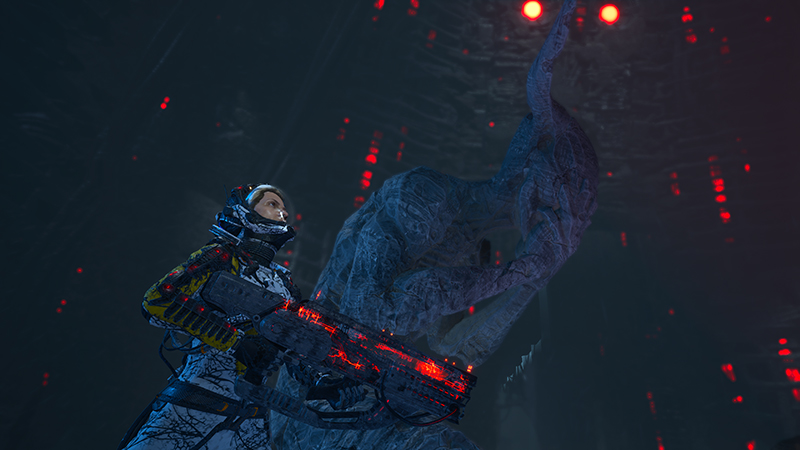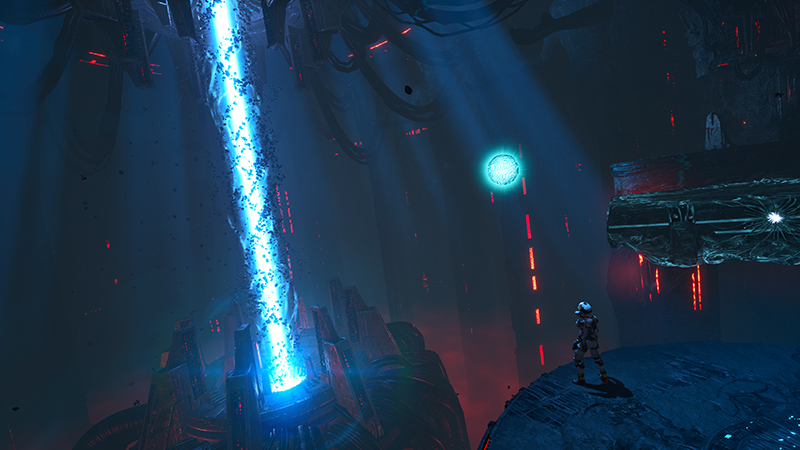Returnal was Housemarque’s breakout title not only for its airtight shooter gameplay, but also for its narrative. It was an unexpectedly strong and mysterious tale that leaned almost exclusively on its lone main character, Selene. Games with stories this remarkable often have a broader roster to lean on. Jane Perry, the voice behind the many sane and twisted versions of Selene, explained how she was able to explore the character using her imagination, direction from Housemarque, a handy numbering system, and a fair bit of wine, too.
Having an imagination is key in many game performances since putting on a ridiculous suit and camera rig in a warehouse is not going to directly translate to any game. But Returnal goes beyond the need for just imagination since Selene doesn’t interact with either of the other two speaking characters in the game. Acting is reacting and when there’s no one to react to, all of the pressure gets put onto one person.
RELATED: Best of 2021: Michael Leri’s Top 10 Games of the Year
Perry talked about how lines from other actors often provide vital context, but since that wasn’t an option here, she had to rely heavily on Narrative Director Greg Louden and Voice Director Damien Goodwin. She said she was more dependent on them than she has been with any other game that she’s done, which is mainly because Selene’s mental state sways so drastically between audio logs. She’s lucid and determined in some audio logs and in utter shambles in others. It’s a lot to keep track of, but the team was able to more easily convey her state using a numbering system.
“In that game, I was very dependent on my performance director and Housemarque to fill in the gaps,” Perry explained. “They had a label for where Selene was at with her state of mind. So they would be like, ‘This is Selene 10 and she is pretty coherent and sane,’ and ‘This is Selene 10,000. She has lost it.’ And so they would let me know what state of mind I would have to put myself in whilst I was delivering my lines. I was more dependent on them than I have been in any other game.”

Ratcheting up to Selene 10,000 was not an easy task. Perry said that oscillating between such extremes was starting to affect her as she tried to put herself into Selene’s headspace, which is not great for a character who is incomprehensibly babbling after seeing her corpse for the thousandth time.
“I started to feel a bit affected by that journey when I was recording it,” she said. “It’s like stepping onto a downward spiral, in a way. And she goes deeper and deeper and deeper into own psychology. And every time she comes back, she comes back in a different mental state. It was quite a journey to try to picture in my mind’s eye where she was at emotionally and mentally and trying to hold those notes. And there were times where I’d get really tired and emotionally worn out by the whole thing. It took a lot of wine.”
RELATED: Reflecting on Hitman’s Last 10 Years With Agent 47 & Diana Burnwood’s Actors
But it wasn’t an exclusively draining experience. Perry admitted that it was exhausting, but it was also a fascinating and interesting journey that she “really loved.” Part of this stemmed from the actual story of the game, as well as Selene. She’s a compelling protagonist, but one with very little in the way of big, bold traits. She is not particularly charming nor does she use quips to endear the player to her, yet she is engrossing and a fitting avatar for the player nonetheless. Perry explained why she thinks that is and how the shared experience between Selene and the player does so much of the heavy lifting.
“I think what is compelling about her is that she is compelled by something unknown, so it’s almost as though you go on a journey with her into the unknown,” said Perry. “And I think that’s a real invitation into this amazing environment that they’ve created with Returnal and because it is psychological, it’s like it opens doors in your mind. There’s relationship to the self and relationship to family, like her mother is in it and her child is also in it. And I think these are all things we can relate to.”

But much like the descent into the sixth biome, it goes deeper. Perry said she thinks that loss is also a crucial part of Selene and how we’re able to bond ourselves to that experience, particularly surrounding Selene’s mother and son.
“And there are times where she is lost,” she continued. “There are very human things that she goes through that we can all relate to: the sense of being lost, the sense of striving for something, the sense of trying to understand something, or being retrospective and constantly going back to that moment in your life when you did something that maybe you regret or things didn’t work out or a relationship that you are constantly grappling with. So I think when they created this character and wrote Selene, they really were tuning into things human beings grapple with on a day-to-day basis, whether they are conscious or subconscious. Maybe it’s the subconscious stuff that is so compelling because we don’t completely understand and she doesn’t completely understand.”

A lot of these challenges are told through metaphors that players have to interpret themselves. It’s all part of Returnal’s appeal of making the player do the work to understand the narrative. Everyone is going to come to a different conclusion about the game and determine what parts are real and what bits are elaborate allegories. Perry was hesitant to give her full explanation of the game since she thinks the strength of the game lies in each person’s personal interpretation, but she ended up giving some of her thoughts of its overall narrative.
“I guess my interpretation is that part of it is literal,” she said, “There is loss in her life. There is trauma in her life. There’s trauma as a mother and trauma as a daughter. The trauma is what she is trying to heal from. And that’s kind of Jungian in a way where she is meeting her shadow side and constantly confronting these monsters and demons and she’s in a battle royale with these things. She’s battling her shadow self and battling her own psychology and trying to make sense of what is going on and she does have that very scientific mind, so she is methodically trying to figure things out, but some things in life, you can’t figure out that way. Sometimes you need a different approach. So I think she’s got things going on consciously and things going on subconsciously.”
RELATED: Hades Creative Director Says Returnal Is ‘One of [His] Favorite Games’ This Year
She elaborated, saying the subconscious elements might even rule the whole game.
“And there’s this idea in life where it is our subconscious minds that are really running the show, so we have to do a lot of work sometimes to figure out what the hell is going on and why you’re doing all these crazy things in life,” she said. “It’s because we have certain beliefs and have had certain things happen that we have to come to terms with. Her journey and struggle is literal and metaphorical.”
Returnal is a beautiful achievement that invites such analysis, which is still striking for a studio that previously told the most basic, one-sentence stories that only served as paper-thin justifications for the arcadey gameplay. Perry’s involvement in that process is admirable, given the weight the role placed on her and how she appropriately brought Selene to life. It was a process that tested her, but one she said was engrossing, which is fitting for a game known for its satisfying difficulty and engaging gameplay.










